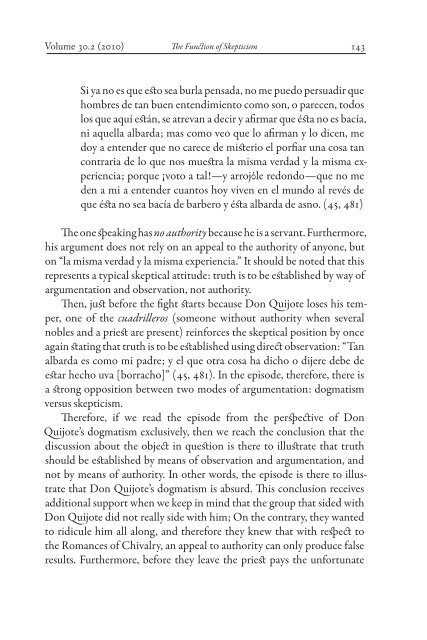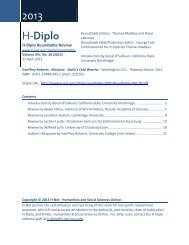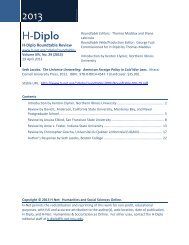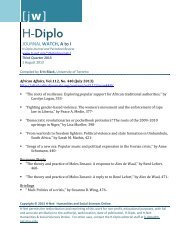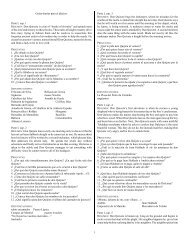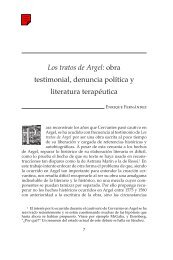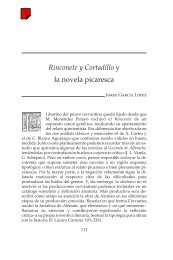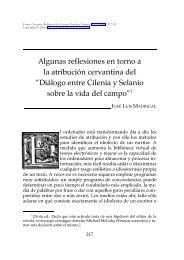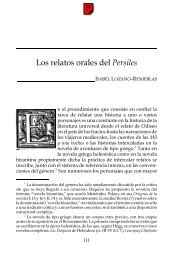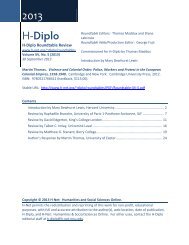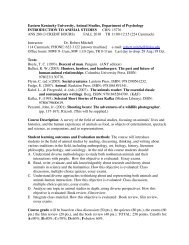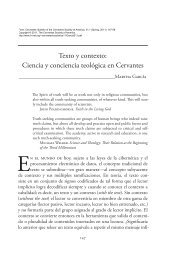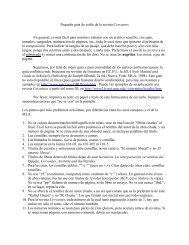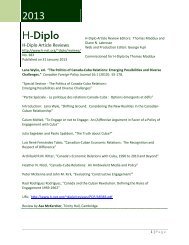The Function of Skepticism in Part I of Don Quijote - H-Net
The Function of Skepticism in Part I of Don Quijote - H-Net
The Function of Skepticism in Part I of Don Quijote - H-Net
Create successful ePaper yourself
Turn your PDF publications into a flip-book with our unique Google optimized e-Paper software.
Volume 30.2 (2010) <strong>The</strong> <strong>Function</strong> <strong>of</strong> <strong>Skepticism</strong><br />
143<br />
Si ya no es que esto sea burla pensada, no me puedo persuadir que<br />
hombres de tan buen entendimiento como son, o parecen, todos<br />
los que aquí están, se atrevan a decir y afirmar que ésta no es bacía,<br />
ni aquella albarda; mas como veo que lo afirman y lo dicen, me<br />
doy a entender que no carece de misterio el porfiar una cosa tan<br />
contraria de lo que nos muestra la misma verdad y la misma experiencia;<br />
porque ¡voto a tal!—y arrojόle redondo—que no me<br />
den a mi a entender cuantos hoy viven en el mundo al revés de<br />
que ésta no sea bacía de barbero y ésta albarda de asno. (45, 481)<br />
<strong>The</strong> one speak<strong>in</strong>g has no authority because he is a servant. Furthermore,<br />
his argument does not rely on an appeal to the authority <strong>of</strong> anyone, but<br />
on “la misma verdad y la misma experiencia.” It should be noted that this<br />
represents a typical skeptical attitude: truth is to be established by way <strong>of</strong><br />
argumentation and observation, not authority.<br />
<strong>The</strong>n, just before the fight starts because <strong>Don</strong> <strong>Quijote</strong> loses his temper,<br />
one <strong>of</strong> the cuadrilleros (someone without authority when several<br />
nobles and a priest are present) re<strong>in</strong>forces the skeptical position by once<br />
aga<strong>in</strong> stat<strong>in</strong>g that truth is to be established us<strong>in</strong>g direct observation: “Tan<br />
albarda es como mi padre; y el que otra cosa ha dicho o dijere debe de<br />
estar hecho uva [borracho]” (45, 481). In the episode, therefore, there is<br />
a strong opposition between two modes <strong>of</strong> argumentation: dogmatism<br />
versus skepticism.<br />
<strong>The</strong>refore, if we read the episode from the perspective <strong>of</strong> <strong>Don</strong><br />
<strong>Quijote</strong>’s dogmatism exclusively, then we reach the conclusion that the<br />
discussion about the object <strong>in</strong> question is there to illustrate that truth<br />
should be established by means <strong>of</strong> observation and argumentation, and<br />
not by means <strong>of</strong> authority. In other words, the episode is there to illustrate<br />
that <strong>Don</strong> <strong>Quijote</strong>’s dogmatism is absurd. This conclusion receives<br />
additional support when we keep <strong>in</strong> m<strong>in</strong>d that the group that sided with<br />
<strong>Don</strong> <strong>Quijote</strong> did not really side with him; On the contrary, they wanted<br />
to ridicule him all along, and therefore they knew that with respect to<br />
the Romances <strong>of</strong> Chivalry, an appeal to authority can only produce false<br />
results. Furthermore, before they leave the priest pays the unfortunate


